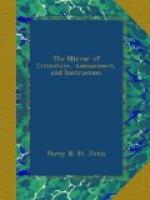the present day; John Howard, Goldsmith, Sir Samuel
Romilly, Franklin, Thomson, the poet, Sheridan,[2]
and Sir Walter Scott. The late Sir William Curtis
was known to be one of the best tempered men of his
day, which made him a great favourite with the late
king. I remember a little incident of Sir William’s
good-nature, which occurred about a year after he had
been Lord Mayor. In alighting from his carriage,
a little out of the regular line, near the Mansion
House, upon some day of festivity, he happened inadvertently,
with the skirts of his coat, to brush down a few apples
from a poor woman’s stall, on the side of the
pavement. Sir William was in full dress, but
instead of passing on with the hauteur which characterizes
so many of his aldermanic brethren, he set himself
to the task of assisting the poor creature to collect
her scattered fruit; and on parting, observing some
of her apples were a little soiled by the dirt, he
drew his hand from his pocket and generously gave
her a shilling. This was too good an incident
for John Bull to lose: a crowd assembled, hurraed,
and cried out, “Well done, Billy,” at
which the good-natured baronet looked back and laughed.
How much more pleasing is it to tell of such demeanour
than of the foolish pride of the late Sir John Eamer,
who turned away one of his travellers merely because
he had in one instance used his bootjack.
[2] May we not, however, say
the friendless Sheridan?
The Author of “A Tradesman’s Lays."
* * * *
*
Probably our correspondent may recollect Sir William
and the orange, at one of the contested City elections.
A “greasy rogue” before the hustings,
seeing the baronet candidate take an orange from his
pocket, put up for the fruit, with the cry
“Give us that orange, Billy.” Sir
William threw him the fruit, which the fellow had no
sooner sucked dry, than he began bawling with increased
energy, “No Curtis,” “No Billy,”
etc. Such an ungrateful act would have soured
even Seneca; but Sir William merely gave a smile,
with a good-natured shake of the head. Sir William
Curtis possessed a much greater share of shrewdness
and good sense than the vulgar ever gave him credit
for. At the Sessions’ dinners, he would
keep up the ball of conversation with the judges and
gentlemen of the bar, in a fuller vein than either
of his brother aldermen. It is true that he had
wealth and distinction, all which his fellow citizens
at table did not enjoy; and these possessions, we
know, are wonderful helps to confidence, if they do
not lead the holder on to assurance.—Ed.
M.
* * * *
*
THE SKETCH BOOK.
* * * *
*
EXTRACTS FROM THE ORIGINAL LETTERS OF AN OFFICER IN
INDIA.[3]
THE SIGHT OF A TIGER.[4]
Secunderabad, 1828.




